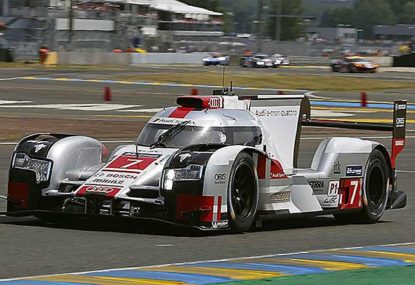The IndyCar Afterburn: The pitfalls and pinnacles of Long Beach 2024
The Long Beach Grand Prix is the Monaco of American motorsport, and this past weekend, the IndyCar Series reminded everyone exactly why. We witnessed…

The manufacturer influx into sportscar racing continued over the weekend, with the announcement that American giant Ford will head back to the 24 hours of Le Mans from next year.
Ford will campaign its new GT in the GTE Pro class from 2015, going up against some high-profile rivals in Chevrolet, Ferrari, Aston Martin and Porsche.
Meanwhile, BMW is reportedly looking into fielding a prototype entry, potentially joining Le Mans winners Porsche and current competitors Audi, Toyota and Nissan on the grid.
Sportscars hasn’t seen this boom in interest since the halcyon days of the World Sportscar Championship, which reached its peak in the eighties and into the early nineties when the likes of Jagaur, Porsche, Peugeot and Nissan raced.
Back then the sportscar series was targeted by Formula One organisers to ensure it didn’t develop into too much of a threat in appeal to fans and manufacturers.
Just over a decade ago, Formula One was overflowing with manufacturers, with Ferrari, Mercedes, BMW, Renault, Jaguar (then owned by Ford), Honda and Peugeot. Today, Ferrari and Mercedes are committed, while Renault and Honda are struggling along.
Ironically, Formula One tried to appeal to manufacturers by moving its engine formula into the direction major makes were heading – energy recovery systems, turbos, smaller capacities.
And yet the complexities of those regulations, the arms race to buy championship success, and the potential to get it so wrong on such a big stage (see Renault and Honda) are resulting in major manufacturers looking to other categories to go racing.
A case in point is Audi. For so long now the German giant has been linked with a Formula One tilt. Some have even suggested the manufacturer will step in and purchase or partner Red Bull Racing to allow the latter to get out of its unhappy Renault alliance. And yet Audi has avoided Formula One while continuing to invest heavily in its sportscar efforts, which has netted 13 victories at the 24 hours of Le Mans since 1999.
Given the increased popularity of sportscar racing and increased competition, which will add meaning to any further Le Mans wins, what could possibly tempt Audi to risk its reputation in the uncertain world of F1?
While manufacturer interest in a particular series comes and goes, it’s fascinating to see how despite the lack of manufacturer depth in Formula One, the power is being centralised to so few.
Ferrari, Mercedes, McLaren Honda and Red Bull have been unwilling to make concessions to assist the small teams, which could force the minnows to become customer operations for the bigger teams.
This means the likes of Williams, Sauber and co. would stop manufacturing their own cars and, in essence, give over control to the bigger teams.
So with power centralised to a small, select group, Formula One will become more dependent on competing manufacturers than ever before. Given the current climate, this could be the undoing of the series.
Intriguingly, Nico Hulkenberg became the first current Formula One driver to win at Le Mans since 1991, in a rival manufacturer to the one his powered by in grand prix. Even youngster Mitch Evans, one of the leading contenders for a grand prix drive on merit, admits he is now looking to sportscars over Formula One, following a strong Le Mans outing and better opportunities. How many more will follow as the Formula One grid shrinks?
In more ways than one, the pendulum appears to be well and truly swinging away from Formula One.